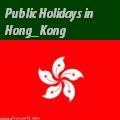
|
Chinese HolidaysVarious public & national holidays observed in Hong Kong |
| sitesworld.comDate | English name |
|---|---|
| January 1 | New Year's Day |
| February 10-12 | Chinese New Year |
| March 29 | Good Friday |
| March 30 | Holy Saturday |
| April 1 | Easter Monday |
| April 4 | Ching Ming Festival |
| May 1 | Labour Day |
| May 17 | Buddha's Birthday |
| June 12 | Dragon Boat Festival |
| July 1 | Hong Kong Special Administrative Region Establishment Day |
| September 20 | Day following the Mid-Autumn Festival |
| October 1 | National Day |
| October 13 | Chung Yeung Festival |
| December 25 | Christmas Day |
| December 26 | Boxing Daysitesworld.com |
| sitesworld.comDate | Name in English | Name in Chinese | Remarks |
|---|---|---|---|
| January 1 | New Year's Day | 元旦新年 | |
| 1st day of 1st month (Chinese calendar) | Chinese New Year | 農曆年初一 | Usually occurs in late January or early February; the most important of the traditional Chinese holidays |
| 2nd day of the 1st month (Chinese calendar) | Second day of Chinese New Year (Chinese New Year) | 農曆年初二 | |
| 3rd day of the 1st month (Chinese calendar) | Third day of Chinese New Year (Chinese New Year) | 農曆年初三 | |
| April 5 (April 4 in leap years) | Ching Ming Festival | 清明節 | Occurs about 15 days after the Vernal Equinox; day for paying respect to one's ancestors |
| Good Friday | 耶穌受難節 | ||
| Day following Good Friday (Holy Saturday) | 耶穌受難節翌日 | ||
| Easter Monday | 復活節星期一 | ||
| May 1 | Labour Day | 勞動節 | |
| 8th day of the 4th month (Chinese calendar) | Buddha's Birthday | 佛誕 | Usually occurs in May; new holiday established in 1998 (general not statutory) |
| 5th day of the 5th month (Chinese calendar) | Dragon Boat Festival (Tuen Ng Festival) | 端午節 | Usually occurs in June; day for patriotic remembrance, eating cakes and dragon boat races |
| July 1 | Hong Kong Special Administrative Region Establishment Day | 香港特別行政區成立紀念日 | |
| 16th day of the 8th month (Chinese calendar) | Day following the Mid-Autumn Festival | 中秋節翌日 | Usually occurs in September; important autumn celebration of harvest and togetherness, with the lighting of lanterns, eating of mooncakes and observation of the moon |
| October 1 | National Day | 中華人民共和國國慶日 | |
| 9th day of the 9th month (Chinese calendar) | Chung Yeung Festival | 重陽節 | Usually occurs in October; day for honouring the elderly and the deceased, and for mountain climbing |
| December 25 | Christmas Day | 聖誕節 | |
| December 26 | Day following Christmas (Boxing Day) | 聖誕節翌日 | sitesworld.com |
| sitesworld.comDate | Name in English | Name in Chinese | Remarks |
|---|---|---|---|
| Every Sunday | Sunday | 星期日 | |
| January 1 | New Year's Day | 一月一日 (元旦新年) | |
| First day of the first moon (Chinese lunar calendar) | Chinese New Year | 農曆年初一 | Usually occurs in late January or early February; the most important of the traditional Chinese holidays |
| Second day of the first moon (Chinese lunar calendar) | Second day of Chinese Lunar New Year | 農曆年初二 | |
| Third day of the first moon (Chinese lunar calendar) | Third day of Chinese Lunar New Year | 農曆年初三 | |
| April 5 (April 4 in leap years) | Ching Ming Festival | 清明節 | Occurs about 15 days after the Vernal Equinox; day for paying respect to one's ancestors |
| May 1 | Labour Day | 勞動節 | |
| Fifth day of the fifth moon (Chinese lunar calendar) | Dragon Boat Festival (Tuen Ng Festival) | 端午節 | Usually occurs in June; day for patriotic remembrance, eating cakes and dragon boat races |
| July 1 | Hong Kong Special Administrative Region Establishment Day | 香港特別行政區成立紀念日 | |
| Sixteenth day of the eighth moon (Chinese lunar calendar) | Day following the Mid-Autumn Festival (or Moon Festival) | 中秋節翌日 | Usually occurs in September; important autumn celebration of harvest and togetherness, with the lighting of lanterns, eating of mooncakes and observation of the moon |
| October 1 | National Day | 中華人民共和國國慶日 | |
| Ninth day of the ninth moon (Chinese lunar calendar) | Chung Yeung Festival | 重陽節 | Usually occurs in October; day for honouring the elderly and the deceased, and for mountain climbing |
| around December 21 or 22 OR December 25 | Winter Solstice OR Christmas Day | 冬至或聖誕節 | either day can be chosen by employers.sitesworld.com |